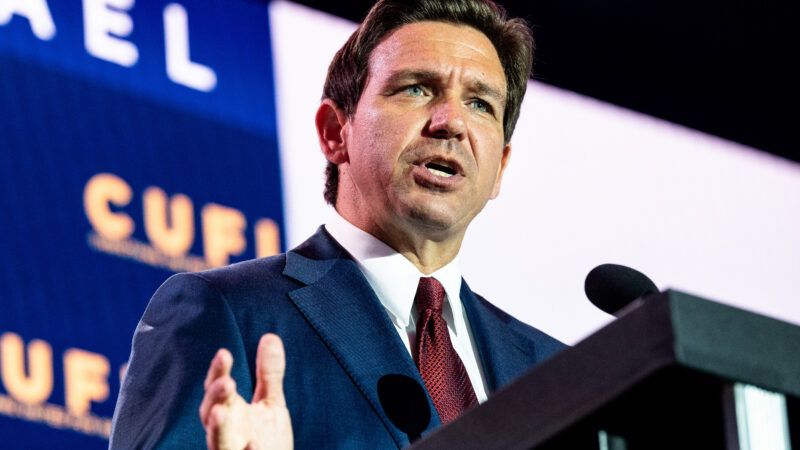DeSantis Unironically Frets About 'Criminalizing Political Differences'
He'd be a stronger candidate if he applied that thinking to situations that don't involve former President Donald Trump.

During a Tuesday interview with CNN, Florida Gov. Ron DeSantis, a Republican, was asked by anchor Jake Tapper to respond to the breaking news that former President Donald Trump could face a federal indictment for his role in instigating the January 6 riot at the U.S. Capitol.
DeSantis' response was a revealing one.
"If [special prosecutor] Jack Smith has evidence of criminality," asked Tapper, "should Donald Trump be held accountable?"
"Here's the problem," DeSantis replied. "This country is going down the road of criminalizing political differences, and I think that's wrong." A few moments later, DeSantis complained about the Department of Justice and the FBI being "weaponized against people they don't like." Eventually, he also got around to saying that he hopes Trump won't be indicted because it "won't be good for the country."
Leave aside, for now, the bigger questions about whether another Trump indictment would be good for the country—or, for that matter, good for DeSantis' own presidential aspirations.
Focus on the first part of DeSantis' answer—the part about how criminalizing political differences is wrong. Tapper didn't seize on that moment, but it would have been interesting to see him follow up by asking DeSantis how that position fits with the Florida governor's extensive track record of wielding the power of the state against those with whom he has political disagreements.
Indeed, the weaponization of the state against those on the political left is the central theme of DeSantis' entire campaign. He proudly boasts that Florida is "where woke goes to die," and has banned schools in Florida from teaching anything that state education bureaucrats might deem to be "critical race theory." Regardless of how he might define the terms "woke" and "critical race theory," there's no denying that his objections to them are purely political.
You could say the same thing about DeSantis' decision during the pandemic to ban private businesses from requiring that workers and customers wear masks. And about his ongoing feud with The Walt Disney Company, Florida's largest employer, which has accused DeSantis of orchestrating an unconstitutional "targeted campaign of government retaliation" after Disney's then-CEO, Bob Chapek, spoke out against DeSantis' so-called "Don't Say Gay" law, which banned discussions of gender identity in public elementary school classrooms (the law was later broadened to include most classrooms up to grade 12).
That's a political disagreement about another political disagreement—and in both cases, DeSantis has aimed to limit the free speech rights of his opponents. While that may not quite rise to the level of "criminalizing political differences," which is what DeSantis accused the Justice Department of doing, DeSantis clearly has no qualms about exercising state power in political fights.
In his recent book, DeSantis makes clear that he would continue to use state power against his political opponents if elected president. "An American revival," DeSantis writes, "requires that corporations are treated as political actors when they use their economic power to advance an ideological agenda." Later in the same chapter, DeSantis imagines various ways in which "the political branches [of government] can protect individual freedom from stridently ideological private actors" by limiting what those private actors can do or say.
The idea that government should intervene to protect some private individuals from the free speech being exercised by other private individuals is both nonsensical and probably unconstitutional. As The Atlantic's Conor Friedersdorf has written about DeSantis' misunderstanding of the value of freedom: "Neither my freedom nor yours requires the state to protect us from an entertainment company urging the state legislature to repeal a bill, or a beer company putting a trans influencer on a can, or whatever else DeSantis regards as a pathology. Indeed, we remain free in part because the First Amendment prevents the state from engaging in that sort of viewpoint discrimination."
Much of what DeSantis has done in Florida and promised to do if elevated to the presidency is jarringly at odds with his criticism on Tuesday of Trump's pending indictment. When you line that moment up against DeSantis' campaign rhetoric, he seems to be saying that the problem with Trump's possible indictment is merely that the state has been weaponized against the wrong person.
But that's the root of the contradiction at the center of DeSantis' campaign: Advocating for greater powers to be wielded against your political foes always creates the opportunity for your political foes to wield that same power against you and your allies.
The way out of that trap is not to double down on illiberalism—even though that's what much of the populist right sees as necessary—but to do exactly what DeSantis said on Tuesday: oppose the criminalization of political differences.
Now let's see if he can apply that same idea more broadly.

Show Comments (67)